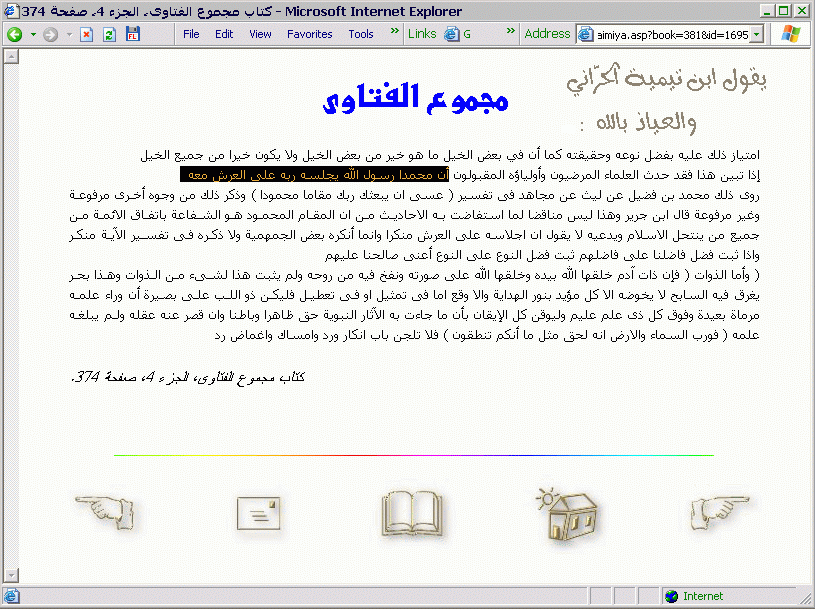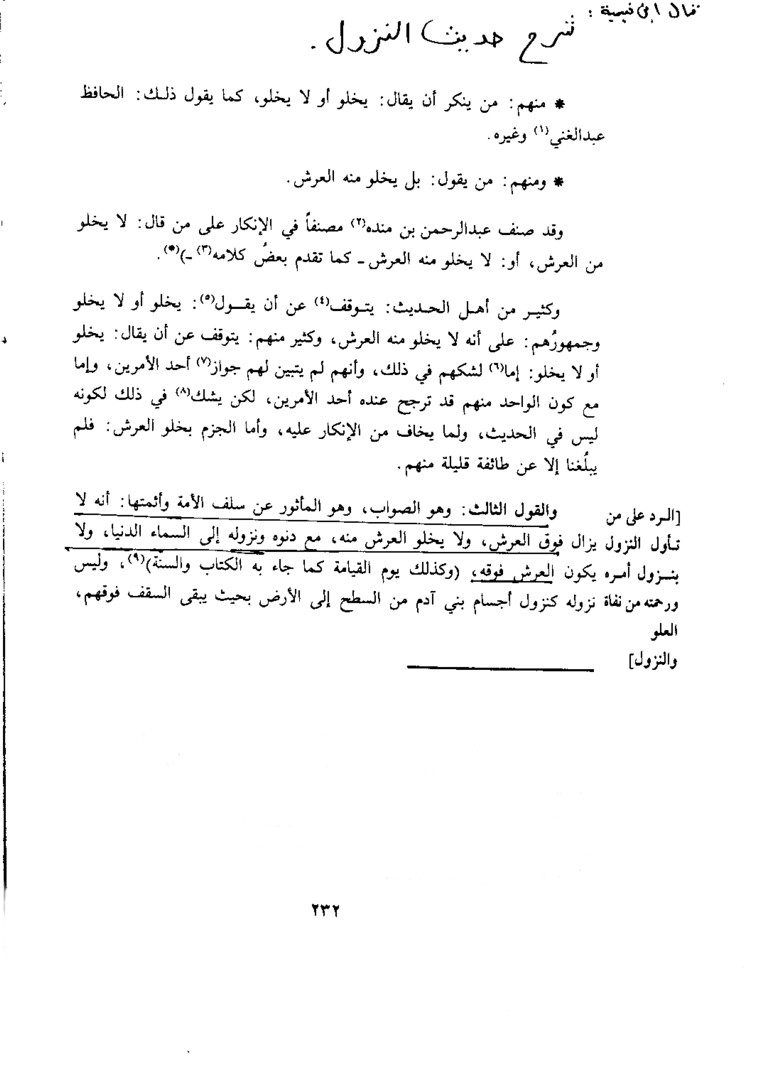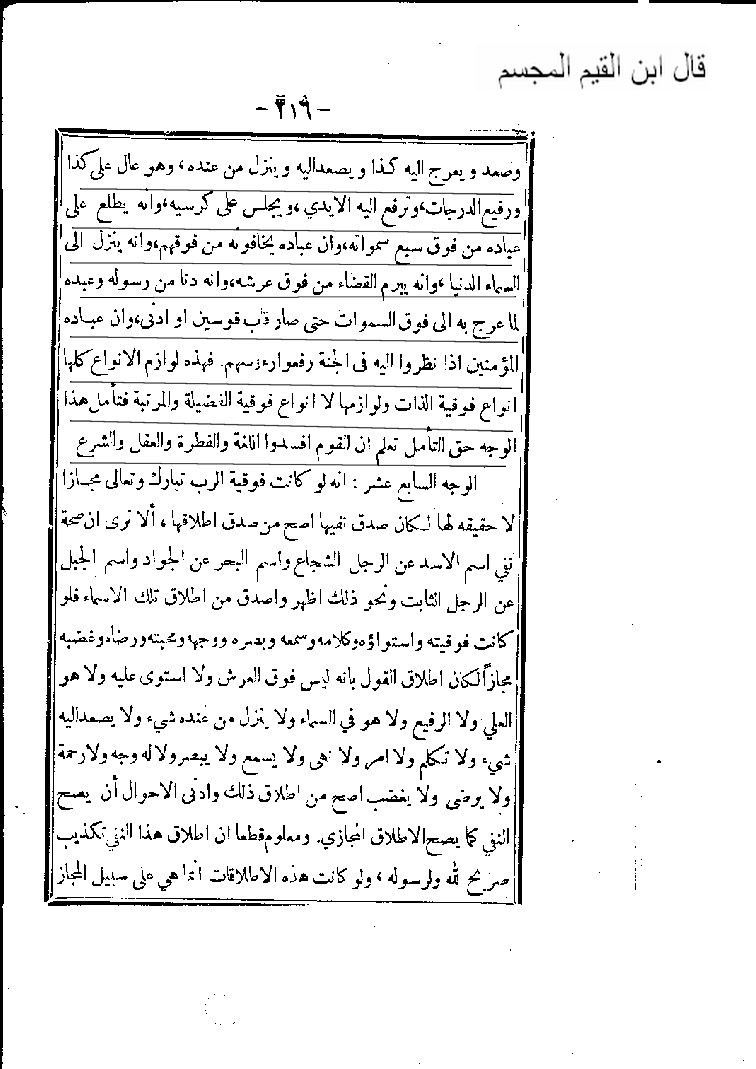|
|
:: Arabic Page |
Bismillah, Alhamdulillah Wasallallahu ^ala Rasulillah, I ask Allah to guide us and you to the correct path.
Be advised that wahabies are a sect that emerged 250 years ago, and they calim that they are Sunna. This sect claims to follow the Hanbaliy school of Imam Ahmad ibn Hanbal Radiallahu ^anhu but that is not true. They do not abide by the teachings of this Madhhab.
However, one of the fabrications wahabies make is using the name of Salaf, or Salafi, or Salafiya as a pseudo name for them.
Why do wahabies claim that they are Salafiya? Or Salafi Followers?
Because the salaf are the Muslims of the first 3 hundred years after the time of the Prophet are called the people of “salaf” or Predecessors. This included the Companions, Tabi^een
This means they were much closer to the time of the Prophet Sallallahu Alayhi Wa Sallam. Thus the references from their sayings about the Islamic belief are most accurate.
However, the wahabies (who use/abuse the name of Salaf) have teachings that are clearly opposing the teachings of the Salaf. One easy way to show this, is mentioning the authentic sayings of the salaf and request the wahabies to abide by it, can they do that? No. They will claim that this saying has a different meaning, or that that scholar who said that made a mistake in the Islamic beliefs (!) or that saying is not true!!
Very easy method to refute the wahabies, is to compare the authentic sayings of the true Salaf to what they say.
Here’s how to show that wahabies truly do not follow the Salaf:
Imam Ahmad Ibn Salamah, Abu Ja^far at¬Tahawiyy, who was born in the year 237 after Hijrah, and was one of the heads of great salaf wrote a book called Al-^Aqidah at¬Tahawiyyah. He mentioned that the content of his book is an elucidation of the creed of Ahl as¬Sunnah wal Jama^ah, which is the creed of Imam Abu Hanifah, who died in the year 150 after al¬Hijrah, and his two companions, Imam Abu Yusuf al-Qadi and Imam Muhammad Ibn al¬Hasan ash-Shaybaniyy and others. He said in his book:
"Allah is supremely clear of all boundaries, extremes, sides, organs and instruments. The six directions do not contain Him--these are attributed to all created things."
Such is the saying of Imam Abu Ja^far who is among the heads of as-Salaf. He explicitly stated that Allah is clear of being contained by the six directions. The six directions are above, below, in front of, behind, right, and left.
Tell the "wahabies" if you abide by these teachings, than you will prove to me that you do follow salaf. But “wahabies” claim that Allah is a body residing in a direction and sits on the throne and they claim that belief is the belief of the salaf. Check the books of Ibn Taymiah whom they re-print his books that states the ill-belief that Allah "sits on the throne" as mentioned in his book Majmoo^ al-Fatawa, as you see below:
Also Wahabies print and support other sayings of Ibn Tayimiah as shown in the following reference:
Also if you look up the saying of their guide Ibnul-Qayim in the following reference:
Also in his Tafsir named "an-Nahr", the Grammarian Abu Hayyan al-'Andalusiyy reported about Ibn Taymiyah having this belief. He said: In his handwriting, a book of Ahmad Ibn Taymiyah, who was contemporary with us, which he called "Kitab-ul-^Arsh", I read: Allah sits on al-Kursiyy and has left a space for the Messenger of Allah to sit with Him. At-Taj Muhammad Ibn ^Aliyy Ibn ^Abd-il-Haqq al-Baranbariyy pretended that he is a promoter of his ideas and tricked him, until he took it from him; we read that in it. [The author of "Kashf-uz-Zunun" reported that about him also in Volume 2, page 1438.]
If we look at the saying of Imam At-Tahawiy who was a true salafiy, and the sayings referenced from books of Wahabies we’ll find that wahabies' sayings oppose his creed, which is the creed of Ahlus-Sunnah.Imam Abu Hanifah said in his book, alWasiyyah,:
" ... and He is the Preserver of al^arsh and other than al-^arsh, without needing it, for had He been in need, He would not have the power to create the world and to manage and preserve it. Moreover, had He been in a place needing to sit and restbefore creating al-^arsh, where was Allah?" That is, the question 'where was Allah' would have applied to Him, which is impossible.
Also, in his book, Al-Fiqh al-Absat, Imam Abu Hanifah said:
"Allah existed eternally and there was no place; He existed before creating the creation. He existed and there was not a place, a creation or a thing; and He is the Creator of everything. He who says 'I do not know if my Lord is in the heavens or on the earth,' is a kafir. Also is a kafir whoever says that 'He is on al-^arsh, and I do not know whether al-^arsh is in the heaven or on the earth'."
Consequently, the great True Salafi Scholar Imam Ahmad declared a kafir whomever says these last two phrases because they contain attributing a direction, boundary, and place to Allah. Everything which has a direction and boundary is by necessity in need of a Creator. Thus it is not the intention of Imam Abu Hanifah to prove that the heaven and al-^arsh are places for Allah, as those who liken Allah to the creation claim. This is by virtue of the aforementioned saying of the Imam: "Had He been in a place needing to sit and rest, then before creating al-^arsh where was Allah?", which is clear in negating that Allah has a direction or a place.Shaykh ^Abdul-Ghaniyy an-Nabulsiyy said:
"He who believes that Allah filled the heavens and earth or that He is a body sitting above al-^arsh, is a kafir."
Ayah 93 of Surat Maryam: means: "All those in the heavens and earth must come to Allah as a slave." In his Tafsir (book of explaining the Qur'an),
Imam ar-Raziyy said:
"... and since it is affirmed by this ayah that everything that existed in the heavens and earth is a slave to Allah, and since it is obligatory that Allah is clear of being a slave, thus He is clear of being in a place or direction, or on al-^arsh or al-kursiyy."
Hence Surat Taha, ayah 5, in the Qur'an, clearly does not mean that Allah sits on the throne or that Allah is firmly established on the throne. In the Arabic language, the word istawa has fifteen (15) different meanings, among of which are to sit, to subjugate, to protect, to conquer, and to preserve. Based on what we have covered so far it is clear that it is blasphemous to apply the meaning 'to sit' to Allah. However the terms to preserve and to subjugate are in compliance with the Religion and the language. And those so-called translations of al-Quran that referred to the term "Istawa" to "Sits" or "Sat"or "Established himself firmly on the throne" contradict Arabic rules, and Islamic bases. Bewarned from such translations and such attribues, Allah is almighty clear from the sitting, movement, size, shape, form or change. Allah is great.
It's sufficient to prove that the true salaf cleared Allah from having shape, form or being contained in place what was mentioned the book, Al-Fiqh al-Absat, of Imam Abu Hanifah where he said:
"Allah existed eternally and there was no place; He existed before creating the creation. He existed and there was not a place, a creation or a thing; and He is the Creator of everything. He who says 'I do not know if my Lord is in the heavens or on the earth,' is a kafir. Also is a kafir whoever says that 'He is on al-^arsh, and I do not know whether al-^arsh is in the heaven or on the earth'."
This is our belief, can wahabies abide by the belief of Abu Hanifah?
If so, let them (wahabies, falsely salafies) get rid of their falsehood and submit to the true beliefs of the true salaf.
Allah knows best.
|
:: Main Page |


